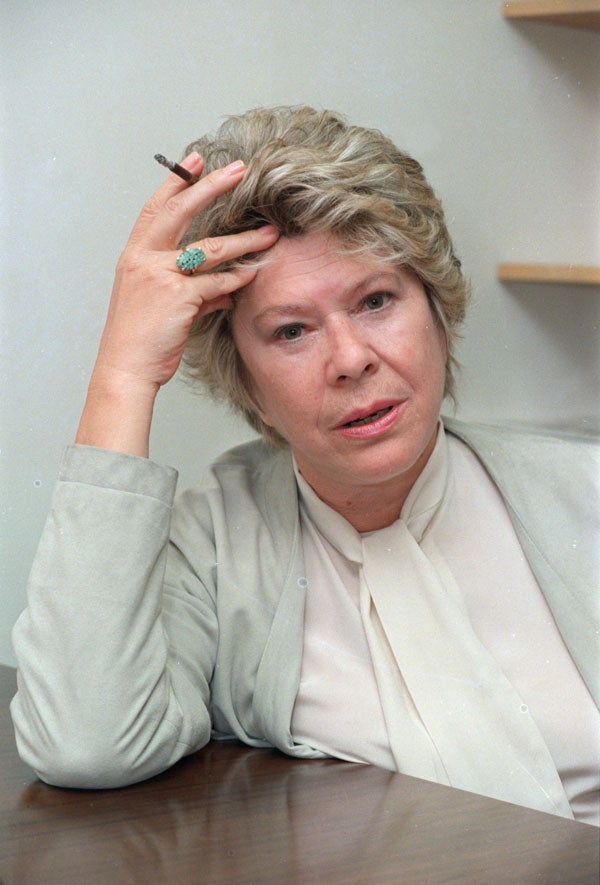The Love Children, By Marilyn French

When The Women's Room was first published in 1977, it was as if Marilyn French had dropped "a bomb in the comfortable concentration camp of the American suburbs," says Susan Faludi. The psychodrama of Mira's stultifying, ball-and-chain marriage to Norm outraged the critics, roused a generation of housewives who had sat, anesthetised, in the dull suburban drawing rooms of East Coast America and became, in part, the fire in the canon of second-wave feminism.
Now, some 30 years after that explosive moment comes the follow-up, The Love Children. The final novel French wrote before she died last year, it is not so much a bomb as a round of gunfire aimed at the present day. She had fired such sallies before – in 2006, she bemoaned that "feminism has almost disappeared from the surface of our society". With this novel, French takes us back to the beginning to reflect on the ideals of this apparently lost cause.
It begins, like The Women's Room, in 1968, but if that book was about the "half-lives" of wives and mothers, The Love Children is about their daughters' lives fully lived. Jessamin is a feisty child of divorce who grows up amid Harvard campus intelligensia after her mother kicks her (famous artist) father out of the marital home.
"We refused on point of death to compromise on our principles", says Jess, before she drops out of college life and heads for the hills to live in a commune. It doesn't work out but Jess, pregnant and unmarried, decides to keep her baby and juggle motherhood with a career. It ends in the present day with reflections on whether the gains of Jess's generation can still be felt.
The problem with this very readable psychological portrait is its inwardness, which leads French to fall prey to the same criticisms angled at second-wave Feminism. Jess's world is one of white privilege, filled with books, menstruation parties and collegiate conversation about deconstruction and Derrida. Whenever she runs out of money or options, she has her wealthy parents to fall back on. Her father helps her raise her child, her mother sends her money at the commune, her friends' paramount concern is to go to a "good school"– to be a Harvard or Smith grad over an Andrews one. Women's liberation, it appears, is for the comfortably well-off.
In attempting to crystallise the essence of a generation, French ends up presenting "sisterhood" as a monolith that eliminates the differences which many modern feminists feel is vital to acknowledge. Feminism long ago became feminisms and I am not sure French's misty-eyed picture of these burnished days of middle-class empowerment captures this reality.
As a curious quirk, almost every woman in the book is tall and strikingly slim. Looks matter to French, but then again, why shouldn't they? There are some lovely period touches in the book – "What are organic vegetables?" asks one character, while another describes the joys of an answering machine: "It's a machine answering the phone!"
French describes the generation with an almost comical gusto: "Sandy announced that she was gay...Hearing this, I confessed I might be gay too" ..."You know what an orgasm is, don't you? You masturbate, right?" This perfect reproduction of the past is both its success and its failure. Together with the waft of weed that hangs in the air like a period piece, so too the air is laced thick with nostalgia. "I think our generation was great," says Jess's husband, while Jess bemoans "the (modern) world is as terrible a place as ever".
One wonders if Jess's story is all nostalgia, or if it's relevant in an age when lone mothers are commonplace and when the pressures on women to "have it all" weigh heavy, which Jess' struggles do not begin to address. Women's issues of the day - the growth of plastic surgery, Playboy culture, new representations which are not necessarily more liberating but which the previous generation could not have imagined - are not even briefly referred to in this reminiscience. French does herself, at the end, question whether old-style sisterhood still applies. "I wonder... Is it important in the scale of things that a few people achieve happy lives? Does it change the balance for the rest? Does it create a usable example?" The reader wonders too.
Join our commenting forum
Join thought-provoking conversations, follow other Independent readers and see their replies
Comments
Bookmark popover
Removed from bookmarks